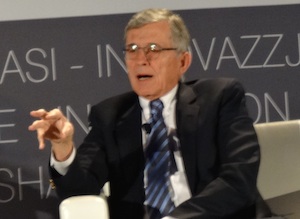U.S. supreme court avoids ruling on limits of federal authority over state and local broadband rules, for now
![By CGP Grey (Alien Xing 4889601316) [CC BY 2.0 (https://creativecommons.org/licenses/by/2.0)], via Wikimedia Commons](https://www.tellusventure.com/images/2015/1/alien_xing.jpg)
When your name is Roswell, reality can be subjective.
The U.S. supreme court declined to wade any deeper into the question of how much leeway local governments have to block installation of cellular towers and equipment. In a decision last week regarding a dispute between T-Mobile and Roswell, Georgia, the court ruled very narrowly in T-Mobile’s favor, saying the city didn’t give its reasons for denying a tower permit soon enough.
Federal telecoms law requires local agencies to give a reason when a tower permit application is rejected, in order to provide a basis for the courts to review the decision if there’s an appeal.… More





![By Unknown photographer; ; Imaging by Gwillhickers [Public domain], via Wikimedia Commons](https://www.tellusventure.com/blog/images/2014/12/post_wagon.jpg)
